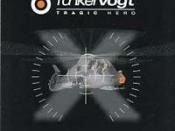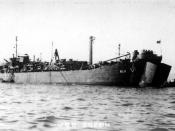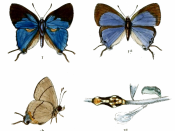The play Antigone by Sophocles is a classic Greek tragedy in every aspect but one. One question remains, who is the tragic hero? First, we should give meaning to what makes up a tragic hero. A tragic hero is a character, usually of high birth, who is neither totally good nor totally evil. Some weakness, error in judgment, or circumstances beyond their control, brings about their own downfall. Antigone is widely thought of as the tragic hero of the play which has her name, but the character that best fits this description in Antigone is Creon.
The first component of being a tragic hero, is of being of high birth. This is easily fulfilled by Creon. He is the son of Menoeceus. He is also the brother in law of Oedipus, and he becomes king of Thebes.
The next thing required is to be neither totally good nor totally evil.
Creon meets this requirement perfectly. At first Creon could be viewed as an evil and cruel ruler, but his intentions are not that of a villain. They are those of a man who is concerned with the well-being of his citizens and of the state. Creon sent Antigone to death, for doing what was right, so we know he isn't completely good. He constantly looks for conspiracies against his ruling (Daniels 101). But he isn't completely evil because he tries to save Antigone later when he discovers the true nature of the situation, and he realizes that he was wrong. However, his admission of guilt doesn't promise of a new beginning (O'Brien 117). He spends a large amount of time trying to talk Antigone out of burying her brother so he wouldn't have to kill her. However, Antigone intended to give her brother a burial, and was glad to die in the attempt. She tells Creon that she feels that if she dies before her turn, that she feels it will be a gain (Sophocles ln 462).
The finial component of being a tragic hero, having their downfall brought about by some weakness or error in judgment Creon's arrogance and pride bring about his pathetic down fall (O'Brien 120 ). Antigone insisted on burying her brother after he was killed in battle because it was the right thing to do by the law of the Gods. Creon would not allow the burial because he felt that it was necessary to prove himself to the citizens of Thebes, since he was the new ruler and had to earn their respect to rule properly. He will not allow justice to come about, simply because he wants to protect his image. He says, " I am no man and she man instead if she can have this conquest without pain" (Sophocles ln 484-485). He believes that mans laws are more important than the gods laws. This arrogance causes him to think that he must put Antigone to death because she refuses to follow his laws over the gods. Many people try to warn him and beg him to reconsider but he refuses to listen. Creon goes as far as accusing his son of being unmanly, led by Antigone, and of being a traitor (Daniels 103). He talks to Haemon and Haemon says he respects his father's ruling, but he feels, in this case, that he was wrong. Haemon asks his father to take his advice and not have Antigone executed. But, because of Creon's pride he gets furious and makes the situation worsethen it already was. Creon was too proud to take advice from someone younger, and in his anger he decided to kill Antigone right away in front of Haemon's. WhenTeiresias comes to warn him by telling him that he was balanced on razor's edge (Sophocles ln 996). He again refuses to listen. Antigone also try's to get him to reconsider, but every time he refuses. Creon is too stubborn and full of pride to listen to anyone, he is too concerned with his power(Nardo 47).
Finally when he sends Antigone to die, the chorus talks some sense into him.
Now he must face the consequences of his actions. Creon becomes responsible for the death of his son and wife by not listening to reason when Haemon tried to get him to ease his punishment of Antigone. By the time Creon does decide to listen to reason, or to Teiresias and Choragos, it was too late, all were dead. He loses all those who are close to him. Knowing that three people are dead because of his ignorance, is a punishment worse than death. He is left to live the rest of his life in guilt and misery. Now Creon realizes that no one else was responsible for his actions, but him self (Daniels 103).
With all the evidence I have found, it is obvious that Creon is the tragic hero in Antigone. He is of high birth, neither totally good nor evil, and has a tragic flaw that causes his downfall.
With the tragic hero found we must now learn from his mistakes. We must keep our pride in check, take respocibility for our actions, and listen to others. We must not be ignorant to what is right in front of us, or we may have Creon's fate.
Bibilography Daniels, Charles B. and Sam Scully. What Really Goes on in Sopholes' Theban Plays. New York: University Press of America. 1996 Nardo, Don. Readings on Antigone. San Diego: Greenhaven Press. 1999.
O'Brien, Joan. Guide to Sophocles' Antigone. London: Southern Illinios University Press. 1978 Sophocles. Antigone. New York; Pocket Books. 1973.
Steiner, George. Antigones. London: Yale University Press. 1984





